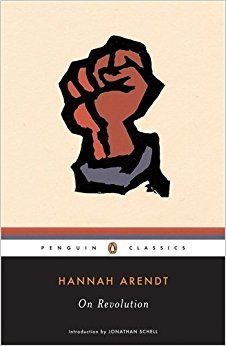Thoughts about Hannah Ardent's On Revolution: Introduction War and Revolution
This is part of my summer reading series where I provide a quick summary of my thoughts and reactions on a chapter by chapter basis. Mostly to organize my own feelings, however, feel free to peruse at your own caution.
War, War Never Changes... Or so I Thought
Ardent starts the book by claiming that wars and revolutions "have thus far determined the physiognomy of the 20th." She goes on by stating that in general, like anything, people need a good reason/marketing slogan to get them involved in all the ruckus wars and revolutions start. It's varied from anywhere between the cheerful cries of "give me liberty or give me death" to the "better dead than red," and concludes with freedom being the new justification as she wrote this in 1963. All I could think about was how the all important decree of Simon Sinek's "know thy why" was creeping into my summer reading on political theory.
However, where Ardent truly gets interesting is when she examines the relationship between wars, goverments, and the military to revolutions/societies. Basically, the roles of all three have drastically changed ever since the advent of destructive technologies (that were on display during WW1) to a point where their relationships to society and revolutions have also changed. No longer can the military do its job to protect its populace in the age ballistic missiles, with its new role instead as a "futile avenger." No government institutions can survive a result in defeat in the age of total war, where now all government institutions "live on borrowed time" as seen in collapses like the Czars following Russia's defeat in the 1905 war with japan. Wars can be fought and won without ever exploding into reality (which to me also perfectly describes cyber warfare) in the age of nuclear deterrence. Wars no longer stay in their time period instead acting as agents of releasing mass waves of violence that effect generations like ripples in a pool; where the violence of breeds violence that is continually manifested in both movements of war and revolution that share violence as "the least common denominator" (where I'm reminded of the fact that WW1 was the starting point of political destabilization whose issues lead to WW2 that have lead to generational issues in places like the middle east that still exist today).
She proudly and correctly asserts in 1963 that the game of power politics has changed where “those will probably win who understand revolution, while those who still put their faith in... war as the last resort of all foreign policy may well discover in a not too distant future that they have become masters in a rather useless and obsolete trade.”
Now all this seems obvious now but to me the main takeaway of this chapter is this assertion of constant change in how actions of societal bodies affect structures. It makes you truly wonder in 1963 when the cold war ushered in an inflection point to how countries conducted political actions via the game of espionage, what the current game of political actions is in today's digitally networked world. Is it sending swarms of Russian bots to muddle the waters of truth? I'm not sure, nor am I sure what the goal of country's political moves are in today's age? Why topple a country via revolution to assert power when all that matters is the talented individuals who support said country's economy? You could just convince people to leave by dividing them instead. As an American citizen, I trust nearly nothing wholeheartedly anymore in today's age of fake news and what institutions benefit from that?
